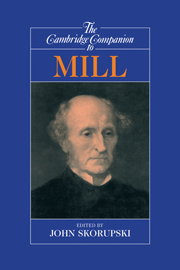Book contents
- Frontmatter
- Introduction
- 1 Mill on language and logic
- 2 Mill, mathematics, and the naturalist tradition
- 3 Mill on induction and scientific method
- 4 Mill, phenomenalism, and the self
- 5 Mill on religion
- 6 Mill on psychology and the moral sciences
- 7 Mill's utilitarianism
- 8 Mill's political economy
- 9 Civilization and culture as moral concepts
- 10 Democracy, socialism, and the working classes
- 11 The subjection of women
- 12 Mill and the Classical world
- 13 The reception and early reputation of Mill's political thought
- 14 Mill in a liberal landscape
- Guide to further reading
- Bibliography
- Index
6 - Mill on psychology and the moral sciences
Published online by Cambridge University Press: 28 May 2006
- Frontmatter
- Introduction
- 1 Mill on language and logic
- 2 Mill, mathematics, and the naturalist tradition
- 3 Mill on induction and scientific method
- 4 Mill, phenomenalism, and the self
- 5 Mill on religion
- 6 Mill on psychology and the moral sciences
- 7 Mill's utilitarianism
- 8 Mill's political economy
- 9 Civilization and culture as moral concepts
- 10 Democracy, socialism, and the working classes
- 11 The subjection of women
- 12 Mill and the Classical world
- 13 The reception and early reputation of Mill's political thought
- 14 Mill in a liberal landscape
- Guide to further reading
- Bibliography
- Index
Summary
They [Coleridge and Bentham] agreed in recognising that sound theory is the only foundation for sound practice, and that whoever despises theory, let him give himself what airs of wisdom he may, is self-convicted of being a quack. If a book were to be compiled containing all the best things ever said on the rule-of-thumb school of political craftsmanship, and on the insufficiency for practical purposes of what the mere practical man calls experience, it is difficult to say whether the collection would be more indebted to the writings of Bentham or of Coleridge.' ( ”Coleridge,” CW X:121)
John Stuart Mill held, with his father, James Mill, and with all utilitarians, that the end of morality and of practice in general is to maximize the general welfare of humankind. However, to achieve any end, including this ultimate end, requires a knowledge of the means to that end, a knowledge of causes and effects that may be used to realize the end. Practice can only be as solid as the theoretical knowledge of fact upon which it is based. But the younger Mill disagreed with his father and the older generation of utilitarians on the nature of that knowledge and on the methods to be used to justify claims to have acquired such knowledge. To be sure, both the older and the younger Mills must be counted within the empiricist camp, with regard to the nature of human knowledge.On this view, human knowledge begins and ends in sense experience, and knowledge of causes is, as Hume argued, knowledge of matter-of-fact regularities (cf. James Mill 1869, L350, 4O2ff).
- Type
- Chapter
- Information
- The Cambridge Companion to Mill , pp. 203 - 254Publisher: Cambridge University PressPrint publication year: 1998
- 10
- Cited by



